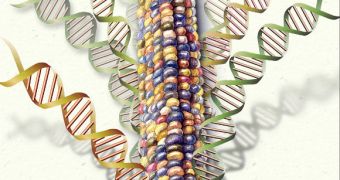As one of the world's most important agricultural commodities, corn is consistently garnering a great deal of interest from researchers who want to avoid new food crises. As part of these efforts, an American research team published the most comprehensive analysis of the corn genome yesterday.
Researchers at the US Department of Agriculture – Agricultural Research Service (USDA-ARS) and Cornell University, in Ithaca, New York, joined forces in an interdisciplinary team to conduct this investigation, which was made available on June 3.
One of the most significant implications of this study is that its conclusions may be used to eventually speed up the development of new varieties of corn, capable of withstanding more severe droughts, different types of pest, and survive in multiple types of soils.
This could ensure that this basic crop does not fail the ever-expanding human population, which is known well beyond the 7 billion mark. Increasing crop yield on available land is an extremely challenging task, but one that could be made easier by the new study.
The team worked with colleagues from the University of Wisconsin-Madison, University of Missouri-Columbia, North Carolina State University, Beijing Genome Institute, the University of California in Davis and the International Maize and Wheat Improvement Center, in Mexico City, on this research.
The US part of the project was financed by both the USDA and the US National Science Foundation (NSF). The conclusions of the study were published in two separate papers, both of which appear in the online issue of the top scientific journal Nature Genetics.
These results could also address other problems plaguing agriculture, such as increasing the efficiency of the corn-to-fuel conversion processes, making crops more resistant to the effects of climate change, and making the most out of available arable land.
“This work represents a major step forward and an important tool in the arsenal available to scientists and breeders for improving a vital source of nutrition,” USDA-ARS administrator, Edward B. Knipling, explains.
“This project is a stellar example of how collaborations of scientists, here and abroad, leverage resources across multiple agencies to enable transformational research with the potential to address urgent societal needs for a bio-based economy," John Wingfield adds.
He holds an appointment as an assistant director in the NSF Biological Sciences Directorate.
Statistically speaking, rice, corn, wheat and potatoes are the most important crops grown by humans. Rice provides 20 percent of all calories consumed around the world all on its own.

 14 DAY TRIAL //
14 DAY TRIAL //